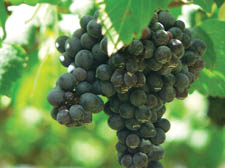|
|
 |
| |

Dark-skinned Syrah grape – also called Shiraz |
Camden Review | The Wine Press | Syrah Grape
Award-winning wines are all well and good, but where can we go to buy them?
A READER pointed to an omission in our article on the Top 100 Vins de Pays competition (June 5) at this year’s London International Wine Fair.
The best Syrah in the competition was Chateau Complazens (£6.49 from Majestic) but the best overall red – not mentioned as it has no UK distributor yet – was the Languedoc Miratus, a Syrah with 20 per cent Grenache and 20 per cent Mourvèdre.
Five of the 14 prize-winning wines at the event have no importer into Britain and only two of the nine sold in Britain are available from a high street chain.
This brings up an interesting question: why bother with a wine column, when many of the best wines at regular trade events are unlikely to be available in UK outlets?
According to Sopexa, the official French PR agency (UK headquarters in Camden), the Top 100 Vins de Pays competition allows producers who may not necessarily have the resources to participate in events such as this to place their products before an international audience. This is not surprising in view of the expense.
Nonetheless, the very success of the competition highlights a serious gap. There is a need to follow up with an adequate database listing these wines and where they can be found in Britain. French producers, generally smaller in size and greater in number than their New World competitors, require this if they are to prosper in a global market. With a large number of small independent producers it is important that everyone has access to information about what is on offer and where.
The alternative – effectively the current status quo – is to rely on the knowledge and skill of small independent wine merchants in searching out these wines.
The evidence is that more of the smaller outlets are actively looking for good wines that would otherwise be overlooked. If this is the case the French government does not need to pay British PR companies to duplicate this work.
Furthermore, if small producers fail to get a fair hearing for their wines, the official machinery for promoting French wines turns inevitably to the larger brands. In other words, simplification and clarification will take place, but at the cost of diversity. French government policy will consequently end up duplicating New World production and distribution.
These comments are timely. Last week the president of France, Nicolas Sarkozy, presented a modernisation plan for French viticulture – the science of growing grapes – promising decentralisation towards producers (“bassins de production”) and a greater role for regions.
But the plan also seeks to restructure “commercial wine-focused companies” to help them become big enough to compete internationally. Who are these commercially focused companies? What will happen to those who fall outside this definition? As with many political statements, the plan is double-edged in that what it doesn’t say is as important as what it does.
This leaves room for two further points about the Top 100 VDP competition. The rising profile of these wines raises questions about the status of the prevailing Appellation d’Origine Controlée (AOC) system, responsible for authenticating all French wines. Is Vin de Pays (VDP) a separate category or an inferior one? Whatever the answer, it is clear that the AOC system, as a whole, works well in certain areas of France and less well in others.
Secondly, the 2008 VDP competition introduced the new category of Vins de Pays Vignobles de France.
For the first time, producers have been allowed to blend wines from different regions enabling them, in the words of Noël Bougrier, leading spokesman for VDP producers, “to compete more directly with New World producers”. Three of these wines made the top 100, but none went any further.
This marks a historic switch for the French since it is the first time that official policy has turned away from the concept of “terroir”, the linking of wine with geology, climate and local experience.
For “local experience” read “community” and all the ambiguities associated with it.
A turning point in official policy has been reached and we’ll have to wait and see where it leads. |
 |
|
|
 |

|
|
 |
|









